3977NRS Leadership and Management: Change Management Report
VerifiedAdded on 2022/11/25
|6
|1313
|373
Report
AI Summary
This report delves into the critical aspects of change management, focusing on the impact of performance appraisal on employee reactions within healthcare settings. The paper begins by defining performance appraisal and its role in organizational change, highlighting factors that contribute to employee resistance, such as unclear reasons for change, fear of the unknown, and lack of trust. It explores strategies for managers to mitigate resistance, including clear communication, employee involvement in planning, and providing regular feedback. The report emphasizes the importance of early and consistent communication to keep employees informed and engaged, as well as the need for leaders to tailor their approach to address individual concerns. Recommendations include involving various personnel departments and the public to achieve effective change within the entire organization. The conclusion stresses the necessity of change for institutions and the importance of conducting appraisals to motivate employees and improve organizational output. The report also includes relevant references to support its findings.
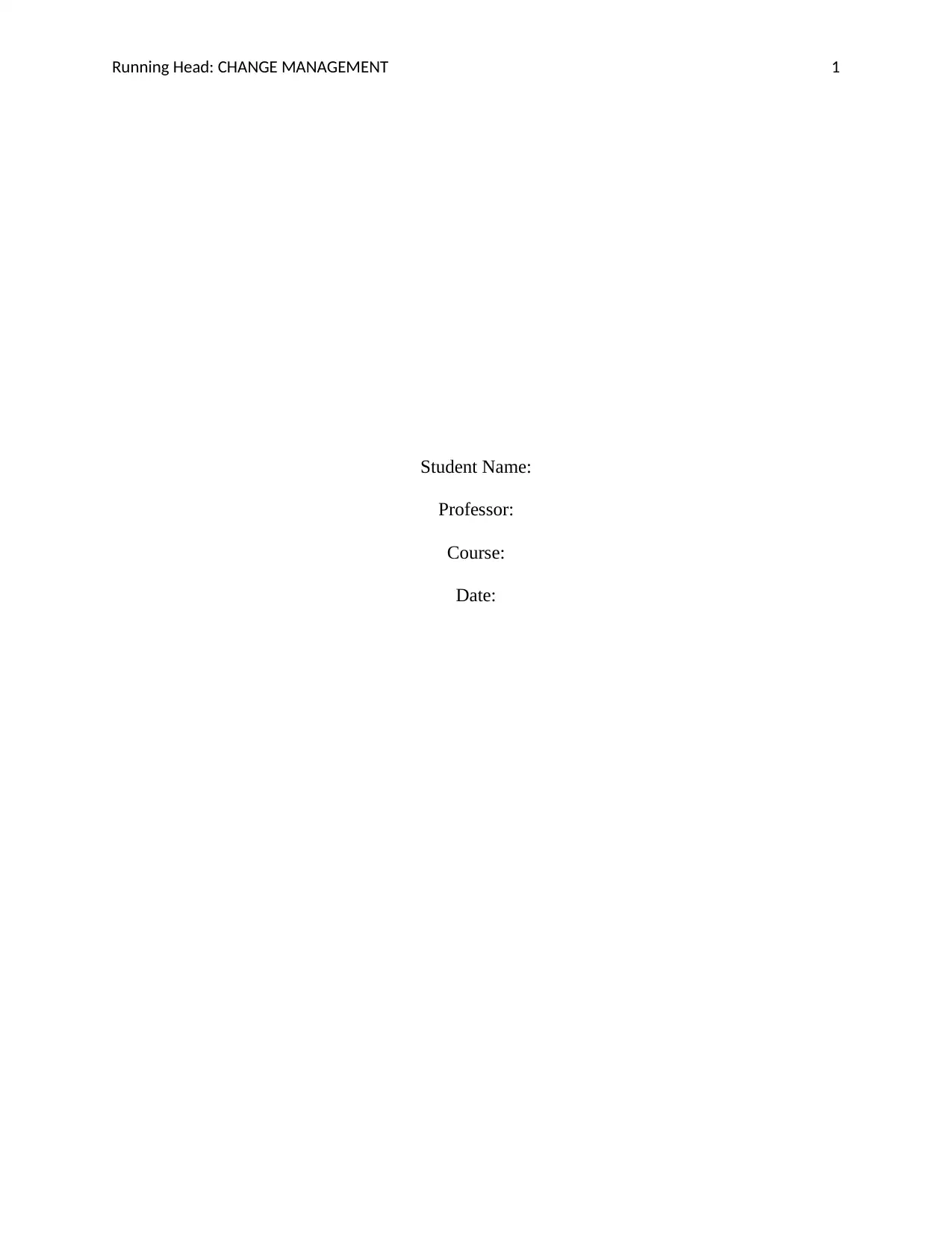
Running Head: CHANGE MANAGEMENT 1
Student Name:
Professor:
Course:
Date:
Student Name:
Professor:
Course:
Date:
Paraphrase This Document
Need a fresh take? Get an instant paraphrase of this document with our AI Paraphraser
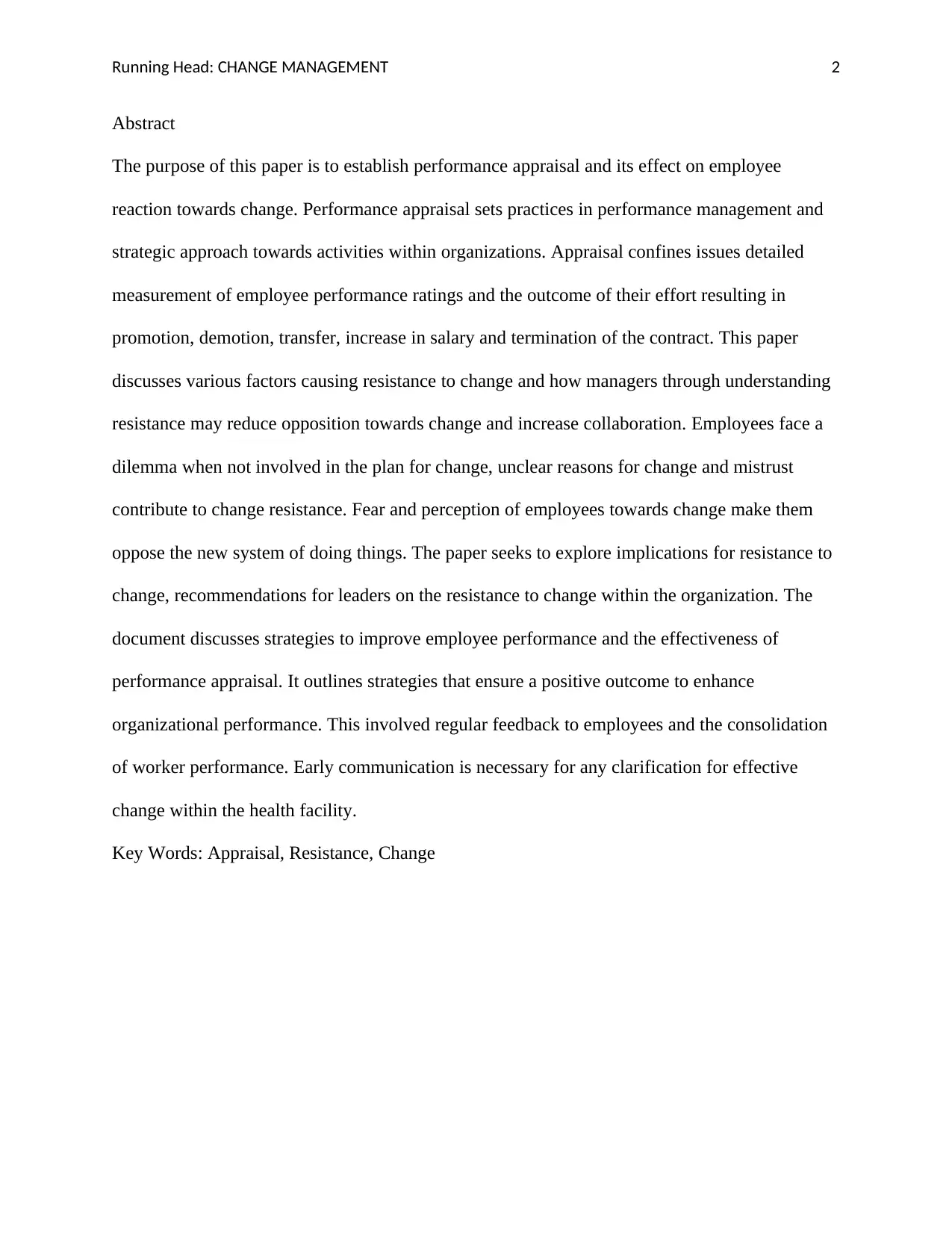
Running Head: CHANGE MANAGEMENT 2
Abstract
The purpose of this paper is to establish performance appraisal and its effect on employee
reaction towards change. Performance appraisal sets practices in performance management and
strategic approach towards activities within organizations. Appraisal confines issues detailed
measurement of employee performance ratings and the outcome of their effort resulting in
promotion, demotion, transfer, increase in salary and termination of the contract. This paper
discusses various factors causing resistance to change and how managers through understanding
resistance may reduce opposition towards change and increase collaboration. Employees face a
dilemma when not involved in the plan for change, unclear reasons for change and mistrust
contribute to change resistance. Fear and perception of employees towards change make them
oppose the new system of doing things. The paper seeks to explore implications for resistance to
change, recommendations for leaders on the resistance to change within the organization. The
document discusses strategies to improve employee performance and the effectiveness of
performance appraisal. It outlines strategies that ensure a positive outcome to enhance
organizational performance. This involved regular feedback to employees and the consolidation
of worker performance. Early communication is necessary for any clarification for effective
change within the health facility.
Key Words: Appraisal, Resistance, Change
Abstract
The purpose of this paper is to establish performance appraisal and its effect on employee
reaction towards change. Performance appraisal sets practices in performance management and
strategic approach towards activities within organizations. Appraisal confines issues detailed
measurement of employee performance ratings and the outcome of their effort resulting in
promotion, demotion, transfer, increase in salary and termination of the contract. This paper
discusses various factors causing resistance to change and how managers through understanding
resistance may reduce opposition towards change and increase collaboration. Employees face a
dilemma when not involved in the plan for change, unclear reasons for change and mistrust
contribute to change resistance. Fear and perception of employees towards change make them
oppose the new system of doing things. The paper seeks to explore implications for resistance to
change, recommendations for leaders on the resistance to change within the organization. The
document discusses strategies to improve employee performance and the effectiveness of
performance appraisal. It outlines strategies that ensure a positive outcome to enhance
organizational performance. This involved regular feedback to employees and the consolidation
of worker performance. Early communication is necessary for any clarification for effective
change within the health facility.
Key Words: Appraisal, Resistance, Change
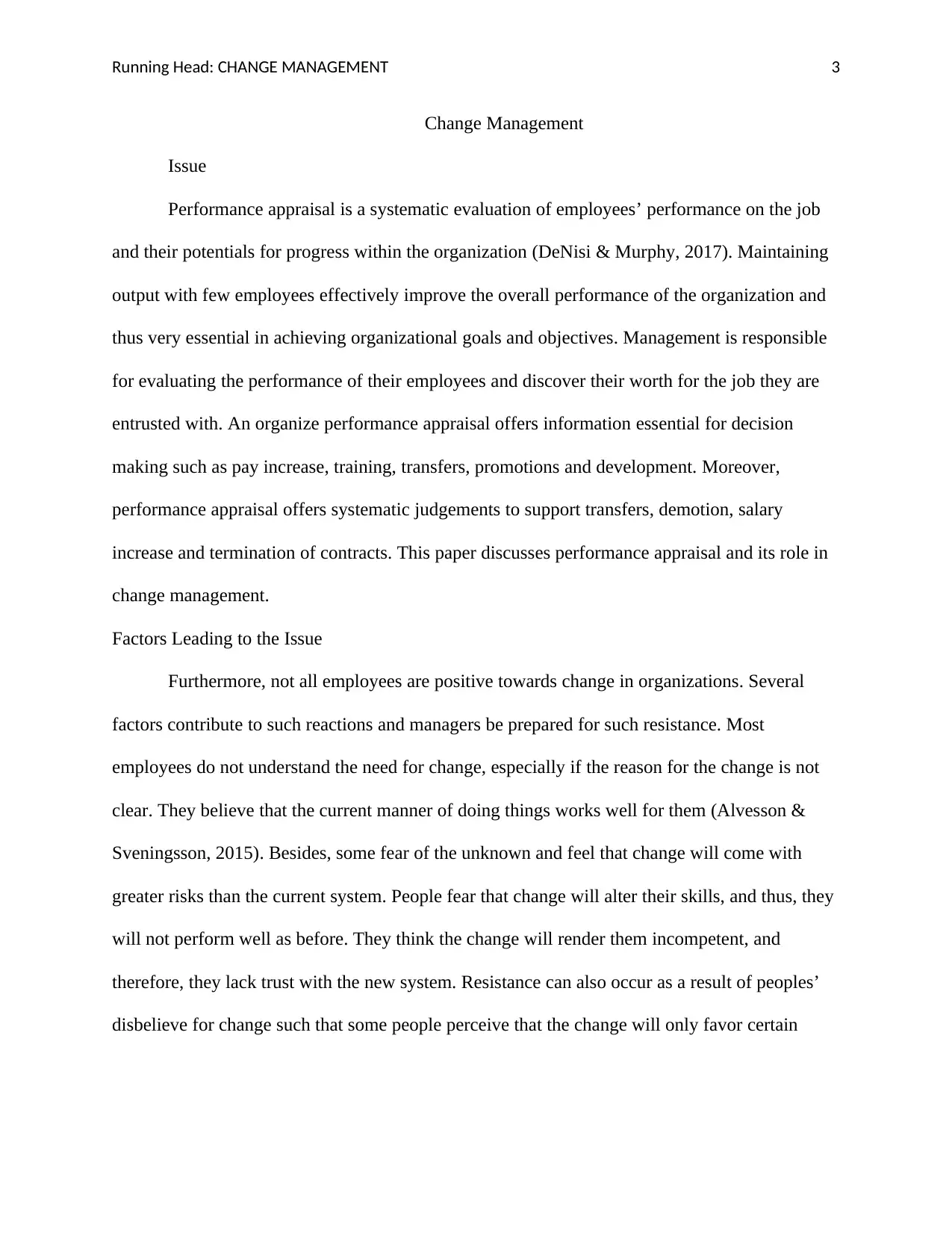
Running Head: CHANGE MANAGEMENT 3
Change Management
Issue
Performance appraisal is a systematic evaluation of employees’ performance on the job
and their potentials for progress within the organization (DeNisi & Murphy, 2017). Maintaining
output with few employees effectively improve the overall performance of the organization and
thus very essential in achieving organizational goals and objectives. Management is responsible
for evaluating the performance of their employees and discover their worth for the job they are
entrusted with. An organize performance appraisal offers information essential for decision
making such as pay increase, training, transfers, promotions and development. Moreover,
performance appraisal offers systematic judgements to support transfers, demotion, salary
increase and termination of contracts. This paper discusses performance appraisal and its role in
change management.
Factors Leading to the Issue
Furthermore, not all employees are positive towards change in organizations. Several
factors contribute to such reactions and managers be prepared for such resistance. Most
employees do not understand the need for change, especially if the reason for the change is not
clear. They believe that the current manner of doing things works well for them (Alvesson &
Sveningsson, 2015). Besides, some fear of the unknown and feel that change will come with
greater risks than the current system. People fear that change will alter their skills, and thus, they
will not perform well as before. They think the change will render them incompetent, and
therefore, they lack trust with the new system. Resistance can also occur as a result of peoples’
disbelieve for change such that some people perceive that the change will only favor certain
Change Management
Issue
Performance appraisal is a systematic evaluation of employees’ performance on the job
and their potentials for progress within the organization (DeNisi & Murphy, 2017). Maintaining
output with few employees effectively improve the overall performance of the organization and
thus very essential in achieving organizational goals and objectives. Management is responsible
for evaluating the performance of their employees and discover their worth for the job they are
entrusted with. An organize performance appraisal offers information essential for decision
making such as pay increase, training, transfers, promotions and development. Moreover,
performance appraisal offers systematic judgements to support transfers, demotion, salary
increase and termination of contracts. This paper discusses performance appraisal and its role in
change management.
Factors Leading to the Issue
Furthermore, not all employees are positive towards change in organizations. Several
factors contribute to such reactions and managers be prepared for such resistance. Most
employees do not understand the need for change, especially if the reason for the change is not
clear. They believe that the current manner of doing things works well for them (Alvesson &
Sveningsson, 2015). Besides, some fear of the unknown and feel that change will come with
greater risks than the current system. People fear that change will alter their skills, and thus, they
will not perform well as before. They think the change will render them incompetent, and
therefore, they lack trust with the new system. Resistance can also occur as a result of peoples’
disbelieve for change such that some people perceive that the change will only favor certain
⊘ This is a preview!⊘
Do you want full access?
Subscribe today to unlock all pages.

Trusted by 1+ million students worldwide
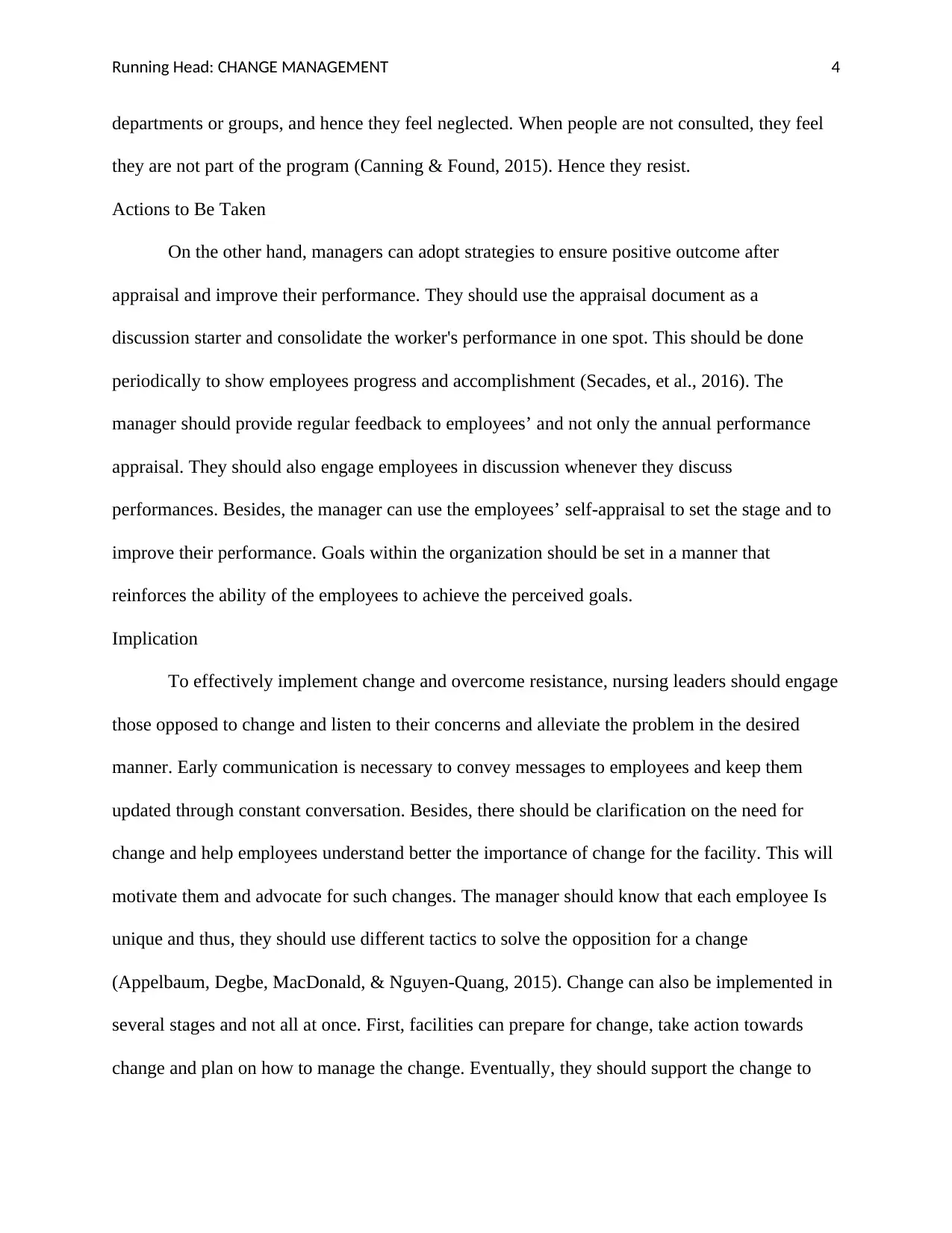
Running Head: CHANGE MANAGEMENT 4
departments or groups, and hence they feel neglected. When people are not consulted, they feel
they are not part of the program (Canning & Found, 2015). Hence they resist.
Actions to Be Taken
On the other hand, managers can adopt strategies to ensure positive outcome after
appraisal and improve their performance. They should use the appraisal document as a
discussion starter and consolidate the worker's performance in one spot. This should be done
periodically to show employees progress and accomplishment (Secades, et al., 2016). The
manager should provide regular feedback to employees’ and not only the annual performance
appraisal. They should also engage employees in discussion whenever they discuss
performances. Besides, the manager can use the employees’ self-appraisal to set the stage and to
improve their performance. Goals within the organization should be set in a manner that
reinforces the ability of the employees to achieve the perceived goals.
Implication
To effectively implement change and overcome resistance, nursing leaders should engage
those opposed to change and listen to their concerns and alleviate the problem in the desired
manner. Early communication is necessary to convey messages to employees and keep them
updated through constant conversation. Besides, there should be clarification on the need for
change and help employees understand better the importance of change for the facility. This will
motivate them and advocate for such changes. The manager should know that each employee Is
unique and thus, they should use different tactics to solve the opposition for a change
(Appelbaum, Degbe, MacDonald, & Nguyen-Quang, 2015). Change can also be implemented in
several stages and not all at once. First, facilities can prepare for change, take action towards
change and plan on how to manage the change. Eventually, they should support the change to
departments or groups, and hence they feel neglected. When people are not consulted, they feel
they are not part of the program (Canning & Found, 2015). Hence they resist.
Actions to Be Taken
On the other hand, managers can adopt strategies to ensure positive outcome after
appraisal and improve their performance. They should use the appraisal document as a
discussion starter and consolidate the worker's performance in one spot. This should be done
periodically to show employees progress and accomplishment (Secades, et al., 2016). The
manager should provide regular feedback to employees’ and not only the annual performance
appraisal. They should also engage employees in discussion whenever they discuss
performances. Besides, the manager can use the employees’ self-appraisal to set the stage and to
improve their performance. Goals within the organization should be set in a manner that
reinforces the ability of the employees to achieve the perceived goals.
Implication
To effectively implement change and overcome resistance, nursing leaders should engage
those opposed to change and listen to their concerns and alleviate the problem in the desired
manner. Early communication is necessary to convey messages to employees and keep them
updated through constant conversation. Besides, there should be clarification on the need for
change and help employees understand better the importance of change for the facility. This will
motivate them and advocate for such changes. The manager should know that each employee Is
unique and thus, they should use different tactics to solve the opposition for a change
(Appelbaum, Degbe, MacDonald, & Nguyen-Quang, 2015). Change can also be implemented in
several stages and not all at once. First, facilities can prepare for change, take action towards
change and plan on how to manage the change. Eventually, they should support the change to
Paraphrase This Document
Need a fresh take? Get an instant paraphrase of this document with our AI Paraphraser
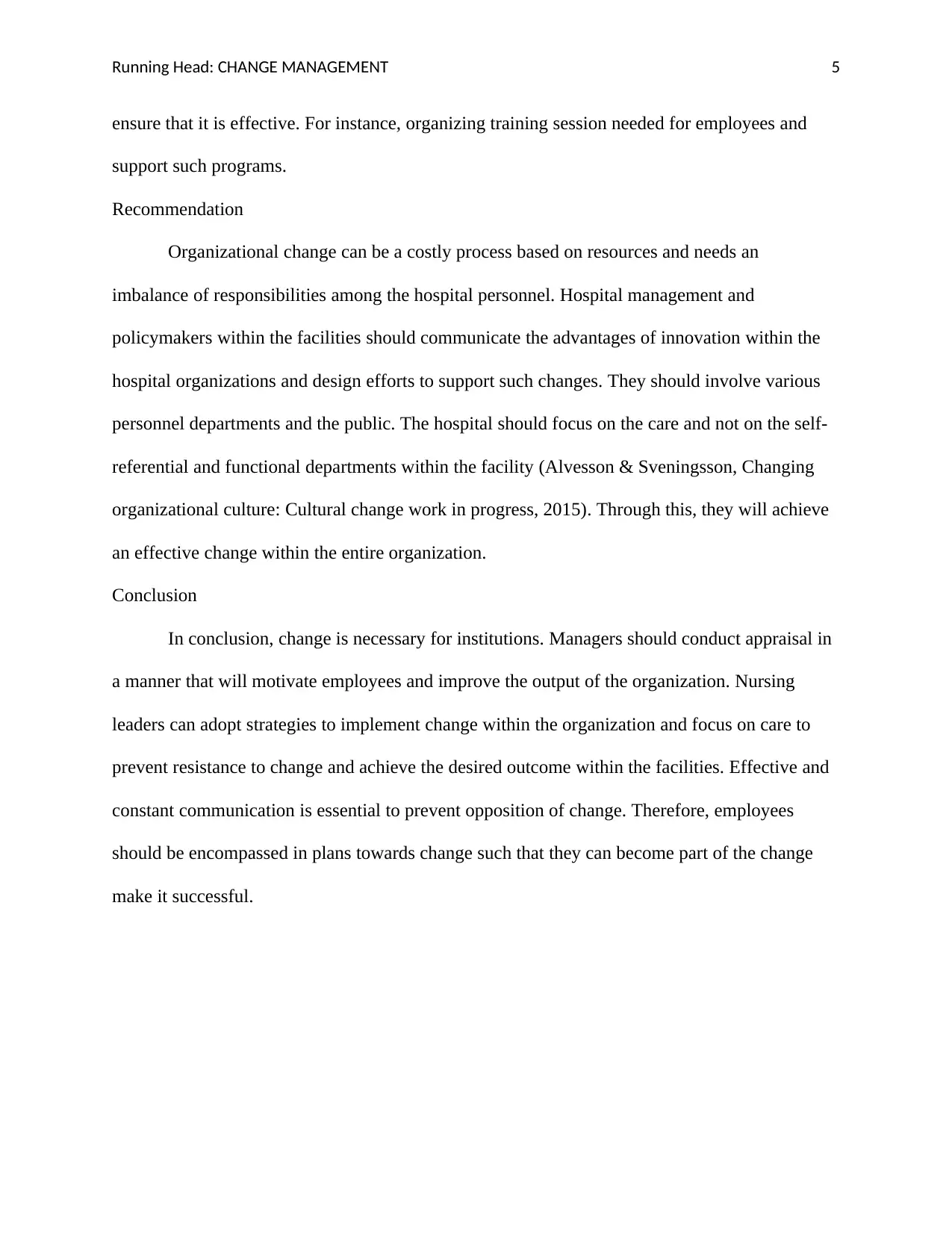
Running Head: CHANGE MANAGEMENT 5
ensure that it is effective. For instance, organizing training session needed for employees and
support such programs.
Recommendation
Organizational change can be a costly process based on resources and needs an
imbalance of responsibilities among the hospital personnel. Hospital management and
policymakers within the facilities should communicate the advantages of innovation within the
hospital organizations and design efforts to support such changes. They should involve various
personnel departments and the public. The hospital should focus on the care and not on the self-
referential and functional departments within the facility (Alvesson & Sveningsson, Changing
organizational culture: Cultural change work in progress, 2015). Through this, they will achieve
an effective change within the entire organization.
Conclusion
In conclusion, change is necessary for institutions. Managers should conduct appraisal in
a manner that will motivate employees and improve the output of the organization. Nursing
leaders can adopt strategies to implement change within the organization and focus on care to
prevent resistance to change and achieve the desired outcome within the facilities. Effective and
constant communication is essential to prevent opposition of change. Therefore, employees
should be encompassed in plans towards change such that they can become part of the change
make it successful.
ensure that it is effective. For instance, organizing training session needed for employees and
support such programs.
Recommendation
Organizational change can be a costly process based on resources and needs an
imbalance of responsibilities among the hospital personnel. Hospital management and
policymakers within the facilities should communicate the advantages of innovation within the
hospital organizations and design efforts to support such changes. They should involve various
personnel departments and the public. The hospital should focus on the care and not on the self-
referential and functional departments within the facility (Alvesson & Sveningsson, Changing
organizational culture: Cultural change work in progress, 2015). Through this, they will achieve
an effective change within the entire organization.
Conclusion
In conclusion, change is necessary for institutions. Managers should conduct appraisal in
a manner that will motivate employees and improve the output of the organization. Nursing
leaders can adopt strategies to implement change within the organization and focus on care to
prevent resistance to change and achieve the desired outcome within the facilities. Effective and
constant communication is essential to prevent opposition of change. Therefore, employees
should be encompassed in plans towards change such that they can become part of the change
make it successful.
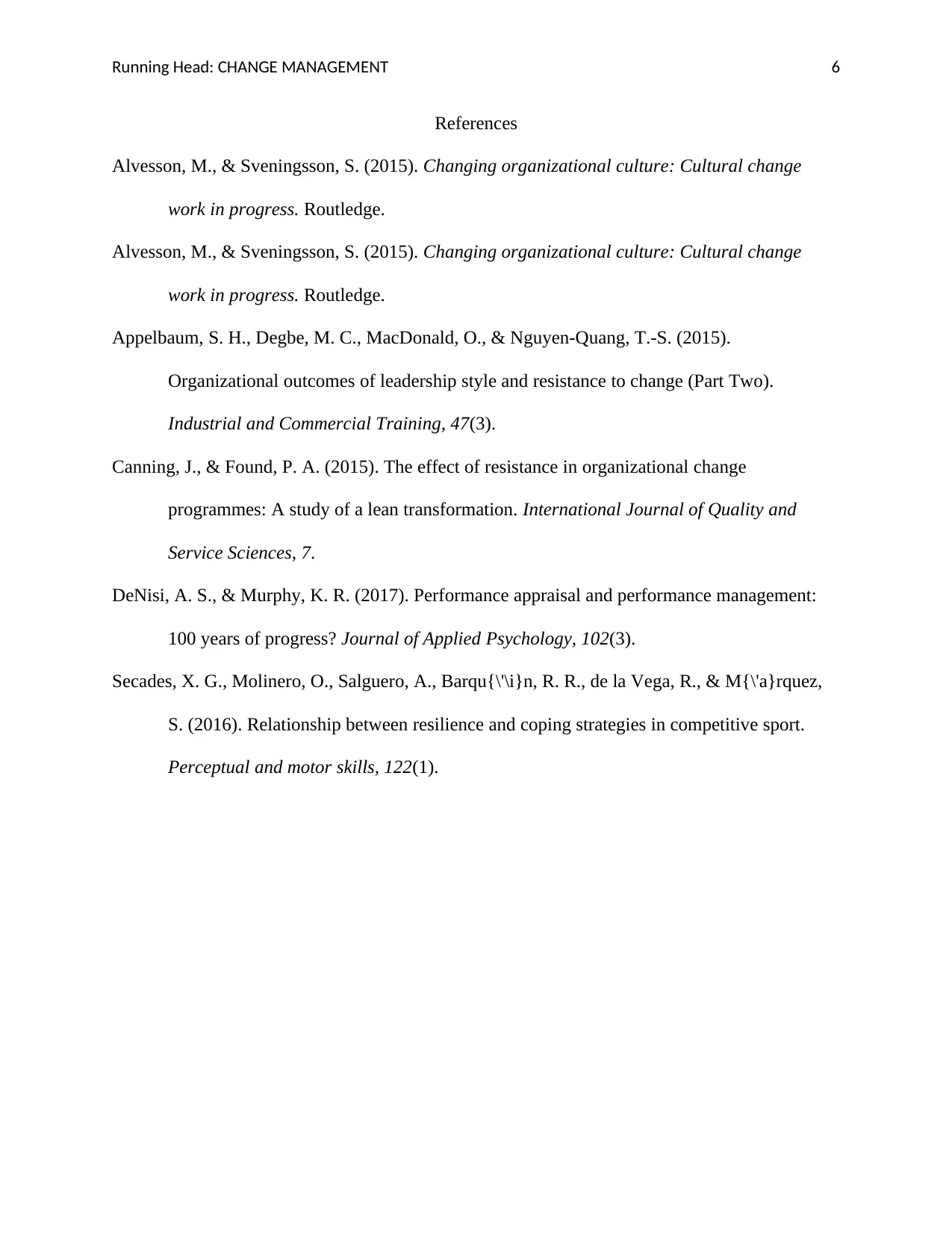
Running Head: CHANGE MANAGEMENT 6
References
Alvesson, M., & Sveningsson, S. (2015). Changing organizational culture: Cultural change
work in progress. Routledge.
Alvesson, M., & Sveningsson, S. (2015). Changing organizational culture: Cultural change
work in progress. Routledge.
Appelbaum, S. H., Degbe, M. C., MacDonald, O., & Nguyen-Quang, T.-S. (2015).
Organizational outcomes of leadership style and resistance to change (Part Two).
Industrial and Commercial Training, 47(3).
Canning, J., & Found, P. A. (2015). The effect of resistance in organizational change
programmes: A study of a lean transformation. International Journal of Quality and
Service Sciences, 7.
DeNisi, A. S., & Murphy, K. R. (2017). Performance appraisal and performance management:
100 years of progress? Journal of Applied Psychology, 102(3).
Secades, X. G., Molinero, O., Salguero, A., Barqu{\'\i}n, R. R., de la Vega, R., & M{\'a}rquez,
S. (2016). Relationship between resilience and coping strategies in competitive sport.
Perceptual and motor skills, 122(1).
References
Alvesson, M., & Sveningsson, S. (2015). Changing organizational culture: Cultural change
work in progress. Routledge.
Alvesson, M., & Sveningsson, S. (2015). Changing organizational culture: Cultural change
work in progress. Routledge.
Appelbaum, S. H., Degbe, M. C., MacDonald, O., & Nguyen-Quang, T.-S. (2015).
Organizational outcomes of leadership style and resistance to change (Part Two).
Industrial and Commercial Training, 47(3).
Canning, J., & Found, P. A. (2015). The effect of resistance in organizational change
programmes: A study of a lean transformation. International Journal of Quality and
Service Sciences, 7.
DeNisi, A. S., & Murphy, K. R. (2017). Performance appraisal and performance management:
100 years of progress? Journal of Applied Psychology, 102(3).
Secades, X. G., Molinero, O., Salguero, A., Barqu{\'\i}n, R. R., de la Vega, R., & M{\'a}rquez,
S. (2016). Relationship between resilience and coping strategies in competitive sport.
Perceptual and motor skills, 122(1).
⊘ This is a preview!⊘
Do you want full access?
Subscribe today to unlock all pages.

Trusted by 1+ million students worldwide
1 out of 6
Related Documents
Your All-in-One AI-Powered Toolkit for Academic Success.
+13062052269
info@desklib.com
Available 24*7 on WhatsApp / Email
![[object Object]](/_next/static/media/star-bottom.7253800d.svg)
Unlock your academic potential
Copyright © 2020–2026 A2Z Services. All Rights Reserved. Developed and managed by ZUCOL.





